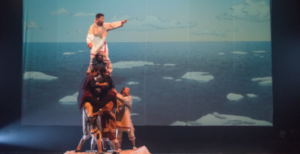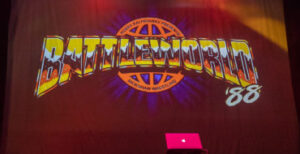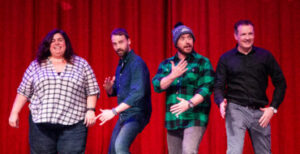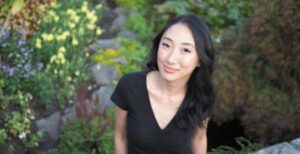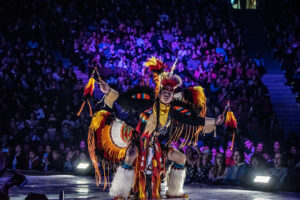
I trekked to Vancouver’s Studio 16 on a rainy Friday night to catch Race Equity Co-op’s production of
Race. The place was a little difficult to find, Google maps gave me the wrong details, and it seemed I wasn’t the only one having trouble. However I eventually found the studio, obtained my tickets and walked into the theatre, psyched to delve into a play written by established playwright and Oscar-nominated screen-writer, David Mamet.
Race centers around two lawyers who are reluctantly defending a wealthy white man accused of raping a black woman. The play confronts the touchy topics of rape and race and, by including a young black woman as the new office legal assistant, the play spirals into themes of indecision, trust as well as morality. The varying values of the four characters means there is disagreement as Mamet explores the question, “What is justice”?
When I walked into Studio 16 I was surprised at how intimate the space was. The stage was not raised; there were limited seats, many of which were startlingly close to the stage. The theatre wasn’t lavish but the seats were comfy and you were allowed to bring in drinks, wine anyone? The play began as the lights dimmed, and the actors blindly but successfully took their places. At first I was uncomfortable with how close I was to the actors, I was naively thinking I might throw them off if I made any sudden movements, but these were professionals and my discomfort quickly wore off as their dialogue and pace began.
There are only four characters in
Race, all of them vital to the plot; this means that each actor gets to showcase their talent. David Mackay’s directing gave the play a smooth pace in terms of the dialogue and blocking which, paired with Itai Erdal’s light design, gave the show a put together and natural feel. Conversations between Harry (Kwesi Ameyaw) and Jack (Aaron Craven) were especially impressive because they included a lot of interrupting and back and forth one-liners, something that got me thinking “I wonder how many times they had to rehearse this”, the answer I gave myself was “A lot”. Sometimes dialogue flow and the legal jargon had me wanting to rewind the show but this, sometimes Gilmore Girl pacing with a drastically more serious tone, let me pair the confusion the characters felt with the confusion I was feeling and that made for a necessary combination.
Every time the character of Charles (Craig Erickson) stepped on stage I was in awe. Charles, the rich white man accused of rape, was in my opinion the most complex. Erickson did a seamless job of leaving this man’s guilt up for the audience’s interpretation. I was always unsure of if Charles was lying or telling the truth, which was fitting because so were his lawyers. Susan (Marsha Regis), the legal assistant, slowly creeps into the spotlight as the show progresses; this slow crawl gives her the advantage of surprise when her character finally presents herself in an unexpected way.
I enjoyed Race Equity Co-op’s production of
Race. There was no intermission during the play and I think it was for the better, this play was one that needed to hold the audience’s attention for as long as it could because rewinding, in the theatre world, is not possible. The atmosphere and subtle hints or clues would be forgotten if the audience had their fifteen minutes to grab that next glass of wine. This play tested my reactions in a way I hadn’t dealt with before and oddly enough I applaud it for that.
The next rainy evening you find yourself wondering what there is to do, check out
Race at Studio 16. Order a glass of wine, have a seat in a tucked away theatre and watch a story unravel, one that will address many thoughts and ideas that most of us are too afraid to confront.
Race is showing at Studio 16 until December 1st. See
here for more information.
 I trekked to Vancouver’s Studio 16 on a rainy Friday night to catch Race Equity Co-op’s production of Race. The place was a little difficult to find, Google maps gave me the wrong details, and it seemed I wasn’t the only one having trouble. However I eventually found the studio, obtained my tickets and walked into the theatre, psyched to delve into a play written by established playwright and Oscar-nominated screen-writer, David Mamet.
Race centers around two lawyers who are reluctantly defending a wealthy white man accused of raping a black woman. The play confronts the touchy topics of rape and race and, by including a young black woman as the new office legal assistant, the play spirals into themes of indecision, trust as well as morality. The varying values of the four characters means there is disagreement as Mamet explores the question, “What is justice”?
When I walked into Studio 16 I was surprised at how intimate the space was. The stage was not raised; there were limited seats, many of which were startlingly close to the stage. The theatre wasn’t lavish but the seats were comfy and you were allowed to bring in drinks, wine anyone? The play began as the lights dimmed, and the actors blindly but successfully took their places. At first I was uncomfortable with how close I was to the actors, I was naively thinking I might throw them off if I made any sudden movements, but these were professionals and my discomfort quickly wore off as their dialogue and pace began.
There are only four characters in Race, all of them vital to the plot; this means that each actor gets to showcase their talent. David Mackay’s directing gave the play a smooth pace in terms of the dialogue and blocking which, paired with Itai Erdal’s light design, gave the show a put together and natural feel. Conversations between Harry (Kwesi Ameyaw) and Jack (Aaron Craven) were especially impressive because they included a lot of interrupting and back and forth one-liners, something that got me thinking “I wonder how many times they had to rehearse this”, the answer I gave myself was “A lot”. Sometimes dialogue flow and the legal jargon had me wanting to rewind the show but this, sometimes Gilmore Girl pacing with a drastically more serious tone, let me pair the confusion the characters felt with the confusion I was feeling and that made for a necessary combination.
Every time the character of Charles (Craig Erickson) stepped on stage I was in awe. Charles, the rich white man accused of rape, was in my opinion the most complex. Erickson did a seamless job of leaving this man’s guilt up for the audience’s interpretation. I was always unsure of if Charles was lying or telling the truth, which was fitting because so were his lawyers. Susan (Marsha Regis), the legal assistant, slowly creeps into the spotlight as the show progresses; this slow crawl gives her the advantage of surprise when her character finally presents herself in an unexpected way.
I enjoyed Race Equity Co-op’s production of Race. There was no intermission during the play and I think it was for the better, this play was one that needed to hold the audience’s attention for as long as it could because rewinding, in the theatre world, is not possible. The atmosphere and subtle hints or clues would be forgotten if the audience had their fifteen minutes to grab that next glass of wine. This play tested my reactions in a way I hadn’t dealt with before and oddly enough I applaud it for that.
The next rainy evening you find yourself wondering what there is to do, check out Race at Studio 16. Order a glass of wine, have a seat in a tucked away theatre and watch a story unravel, one that will address many thoughts and ideas that most of us are too afraid to confront.
Race is showing at Studio 16 until December 1st. See here for more information.
I trekked to Vancouver’s Studio 16 on a rainy Friday night to catch Race Equity Co-op’s production of Race. The place was a little difficult to find, Google maps gave me the wrong details, and it seemed I wasn’t the only one having trouble. However I eventually found the studio, obtained my tickets and walked into the theatre, psyched to delve into a play written by established playwright and Oscar-nominated screen-writer, David Mamet.
Race centers around two lawyers who are reluctantly defending a wealthy white man accused of raping a black woman. The play confronts the touchy topics of rape and race and, by including a young black woman as the new office legal assistant, the play spirals into themes of indecision, trust as well as morality. The varying values of the four characters means there is disagreement as Mamet explores the question, “What is justice”?
When I walked into Studio 16 I was surprised at how intimate the space was. The stage was not raised; there were limited seats, many of which were startlingly close to the stage. The theatre wasn’t lavish but the seats were comfy and you were allowed to bring in drinks, wine anyone? The play began as the lights dimmed, and the actors blindly but successfully took their places. At first I was uncomfortable with how close I was to the actors, I was naively thinking I might throw them off if I made any sudden movements, but these were professionals and my discomfort quickly wore off as their dialogue and pace began.
There are only four characters in Race, all of them vital to the plot; this means that each actor gets to showcase their talent. David Mackay’s directing gave the play a smooth pace in terms of the dialogue and blocking which, paired with Itai Erdal’s light design, gave the show a put together and natural feel. Conversations between Harry (Kwesi Ameyaw) and Jack (Aaron Craven) were especially impressive because they included a lot of interrupting and back and forth one-liners, something that got me thinking “I wonder how many times they had to rehearse this”, the answer I gave myself was “A lot”. Sometimes dialogue flow and the legal jargon had me wanting to rewind the show but this, sometimes Gilmore Girl pacing with a drastically more serious tone, let me pair the confusion the characters felt with the confusion I was feeling and that made for a necessary combination.
Every time the character of Charles (Craig Erickson) stepped on stage I was in awe. Charles, the rich white man accused of rape, was in my opinion the most complex. Erickson did a seamless job of leaving this man’s guilt up for the audience’s interpretation. I was always unsure of if Charles was lying or telling the truth, which was fitting because so were his lawyers. Susan (Marsha Regis), the legal assistant, slowly creeps into the spotlight as the show progresses; this slow crawl gives her the advantage of surprise when her character finally presents herself in an unexpected way.
I enjoyed Race Equity Co-op’s production of Race. There was no intermission during the play and I think it was for the better, this play was one that needed to hold the audience’s attention for as long as it could because rewinding, in the theatre world, is not possible. The atmosphere and subtle hints or clues would be forgotten if the audience had their fifteen minutes to grab that next glass of wine. This play tested my reactions in a way I hadn’t dealt with before and oddly enough I applaud it for that.
The next rainy evening you find yourself wondering what there is to do, check out Race at Studio 16. Order a glass of wine, have a seat in a tucked away theatre and watch a story unravel, one that will address many thoughts and ideas that most of us are too afraid to confront.
Race is showing at Studio 16 until December 1st. See here for more information. 



